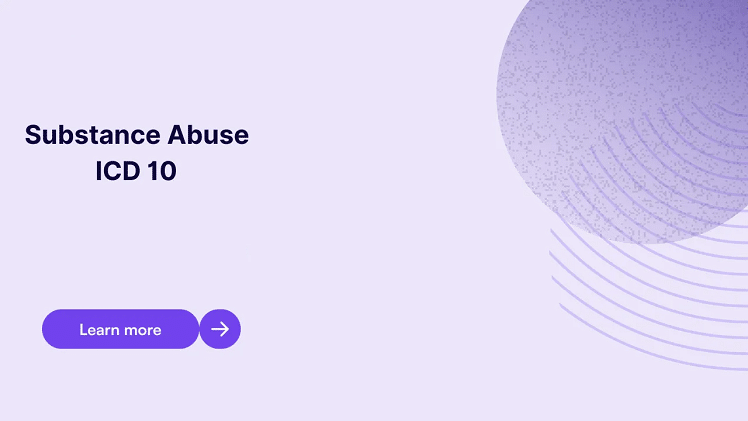Substance Abuse ICD 10 continues to be a pressing public health issue across the globe, leading to numerous physical, mental, and social complications. To effectively diagnose and treat substance use disorders, healthcare professionals rely on the ICD10 (International Classification of Diseases, 10th Revision) system. This classification provides an organized set of codes that help identify specific substance-related disorders, ensuring accuracy in diagnosis, treatment planning, and insurance billing. This comprehensive guideline will provide you with the key ICD10 codes used for diagnosing and treating substance abuse, their role in medical practice, and their impact on treatment outcomes.
What Are ICD10 Codes and How Do They Apply to Substance Abuse?
Medical professionals use ICD10 codes for substance abuse to classify and document various types of substance use disorders, including addiction to alcohol, opioids, cannabis, and other drugs. These codes are essential for standardizing diagnoses across healthcare systems, which ensures uniformity in treatment protocols and helps in the proper handling of insurance claims. Using specific ICD10 codes allows healthcare providers to communicate patient diagnoses easily and needs across various medical teams and departments.
| Substance | ICD10 Code | Description |
| Alcohol | F10.1 | Alcohol abuse with intoxication |
| Opioids | F11.20 | Opioid dependence, uncomplicated |
| Cannabis | F12.10 | Cannabis abuse, uncomplicated |
| Sedatives | F13.10 | Sedative, hypnotic, or anxiolytic abuse, uncomplicated |
| Cocaine | F14.10 | Cocaine abuse, uncomplicated |
| Hallucinogens | F16.10 | Hallucinogen abuse, uncomplicated |
| Nicotine | F17.200 | Nicotine dependence, unspecified |
| Stimulants | F15.10 | Other stimulant abuse, uncomplicated |
These codes provide a comprehensive way to document different substance-related conditions, allowing doctors to make informed decisions about treatment approaches.
Why Accurate Diagnosis with ICD10 Codes Is Crucial in Substance Abuse Treatment
Accurate diagnosis is the cornerstone of effective substance abuse treatment. By using the correct ICD10 codes, healthcare providers can create personalized treatment plans based on the specific type and severity of the substance use disorder. This enables healthcare professionals to offer tailored medical and psychological interventions, ranging from detoxification to long-term therapy and counseling.
Moreover, using the appropriate ICD10 codes ensures that patients receive the correct care and that insurance providers properly compensate healthcare institutions. It also enhances collaboration among healthcare teams and supports tracking patient outcomes over time.
| Substance | ICD10 Code | Description |
| Alcohol | F10.2 | Alcohol dependence, uncomplicated |
| Opioids | F11.21 | Opioid dependence with withdrawal symptoms |
| Cannabis | F12.20 | Cannabis dependence, uncomplicated |
| Sedatives | F13.20 | Sedative dependence, uncomplicated |
| Cocaine | F14.20 | Cocaine dependence, uncomplicated |
| Hallucinogens | F16.20 | Hallucinogen dependence, uncomplicated |
| Nicotine | F17.210 | Nicotine dependence, in remission |
| Stimulants | F15.20 | Other stimulant dependence, uncomplicated |
These codes allow physicians to specify whether a patient is struggling with dependence or experiencing withdrawal symptoms, thus guiding the course of treatment accordingly.
Developing Substance Abuse Treatment Plans Based on ICD10 Diagnoses
Once a diagnosis is confirmed using the relevant ICD10 codes, healthcare providers can develop a comprehensive treatment plan for the individual. Effective treatment for substance abuse generally involves a combination of medical interventions, behavioral therapies, and peer support.
Key Elements of Substance Abuse Treatment Plans
Medical Detoxification
Medical detox is usually the first step in substance abuse treatment, especially in cases involving severe dependence. This process involves helping the patient withdraw safely from the substance under medical supervision. It aims to minimize withdrawal symptoms and prevent medical complications.
Behavioral Therapies
Treatment often includes cognitive-behavioral therapy (CBT), motivational interviewing, and other forms of therapy designed to help individuals change their behavior related to substance use. These therapies address the psychological component of addiction.
Medication-Assisted Treatment (MAT)
For some substances, such as opioids and alcohol, medications are used to help manage withdrawal symptoms, reduce cravings, or block the effects of the drug. Common medications include methadone, buprenorphine, and naltrexone.
Peer Support Programs
Support groups like Alcoholics Anonymous (AA) or Narcotics Anonymous (NA) play a vital role in maintaining long-term recovery. These programs offer a community of individuals who share similar experiences and provide mutual support.
Family and Community Support
Involving family members and the patient’s community can significantly improve treatment outcomes. Family therapy and education can help address the social factors contributing to substance abuse.
Integrated treatment plans that address both the physical and psychological aspects of addiction are critical for promoting long-term recovery.
ICD10 Codes for Co-Occurring Mental Health Disorders
Substance abuse often occurs alongside other mental health conditions, such as anxiety, depression, or bipolar disorder. This combination, known as dual diagnosis, requires an integrated treatment approach. Properly diagnosing both the substance abuse and the mental health condition is essential to ensure the patient receives the most effective care.
| Mental Health Disorder | ICD10 Code | Description |
| Depression | F32.9 | Major depressive disorder, single episode, unspecified |
| Anxiety Disorder | F41.9 | Anxiety disorder, unspecified |
| Bipolar Disorder | F31.9 | Bipolar disorder, unspecified |
| Schizophrenia | F20.9 | Schizophrenia, unspecified |
| Post-Traumatic Stress Disorder | F43.10 | PTSD, unspecified |
Treating dual-diagnosis patients can be more complex, as both the substance use disorder and the mental health condition need to be addressed concurrently. Ignoring one of these issues can lead to relapse or inadequate treatment of the patient’s mental health.
Overcoming Challenges in Using ICD10 Codes for Substance Abuse
While the ICD10 coding system is comprehensive, it does present some challenges. One of the most significant issues is the complexity of the coding system itself. With many codes available, it can be difficult for medical professionals to choose the most accurate code, particularly in cases involving multiple substances or co-occurring conditions.
Additionally, ongoing training in using ICD10 codes is essential to prevent coding errors. Inaccurate coding can lead to misdiagnosis, inappropriate treatment, and issues with insurance reimbursements. Hospitals and medical institutions should ensure staff are regularly trained and updated on the latest coding practices to avoid these pitfalls.
FAQs about substance abuse ICD 10 codes
Q: What is the ICD10 code for alcohol abuse?
A: The ICD10 code for alcohol abuse is F10.1, which refers to alcohol abuse with intoxication. If the condition progresses to dependence, the code changes to F10.2.
Q: How are ICD10 codes applied in substance abuse treatment?
A: ICD10 codes diagnose substance use disorders and guide healthcare providers in developing individualized treatment plans. These codes are also crucial for accurate documentation and insurance billing.
Q: What does dual diagnosis mean in the context of substance abuse?
A: Dual diagnosis refers to the presence of both a substance use disorder and a co-occurring mental health disorder, such as depression or anxiety. Treatment must address both conditions simultaneously for effective recovery.
Q: How do ICD10 codes differentiate between substance abuse and dependence?
A: ICD10 codes differentiate substance abuse from substance dependence by indicating the severity of the disorder. For example, F11.10 indicates opioid abuse, while F11.20 represents opioid dependence.
Q: Are there ICD10 codes specifically for withdrawal symptoms?
A: Yes, ICD10 codes, such as F11.21 for opioid dependence with withdrawal symptoms, specify when a patient is experiencing withdrawal. This helps in directing the appropriate treatment.
Wrapping Up
The use of substance abuse ICD 10 codes is crucial in ensuring accurate diagnoses, creating tailored treatment plans, and improving the quality of care for individuals suffering from addiction. These codes allow healthcare providers to identify the specific substances involved, assess the severity of the disorder, and determine the best course of treatment. Accurate coding not only streamlines communication between healthcare providers but also ensures that insurance claims are processed smoothly. As the healthcare industry continues to evolve, ongoing education and training in using Substance Abuse ICD 10 codes will be essential for maintaining high standards of care.



